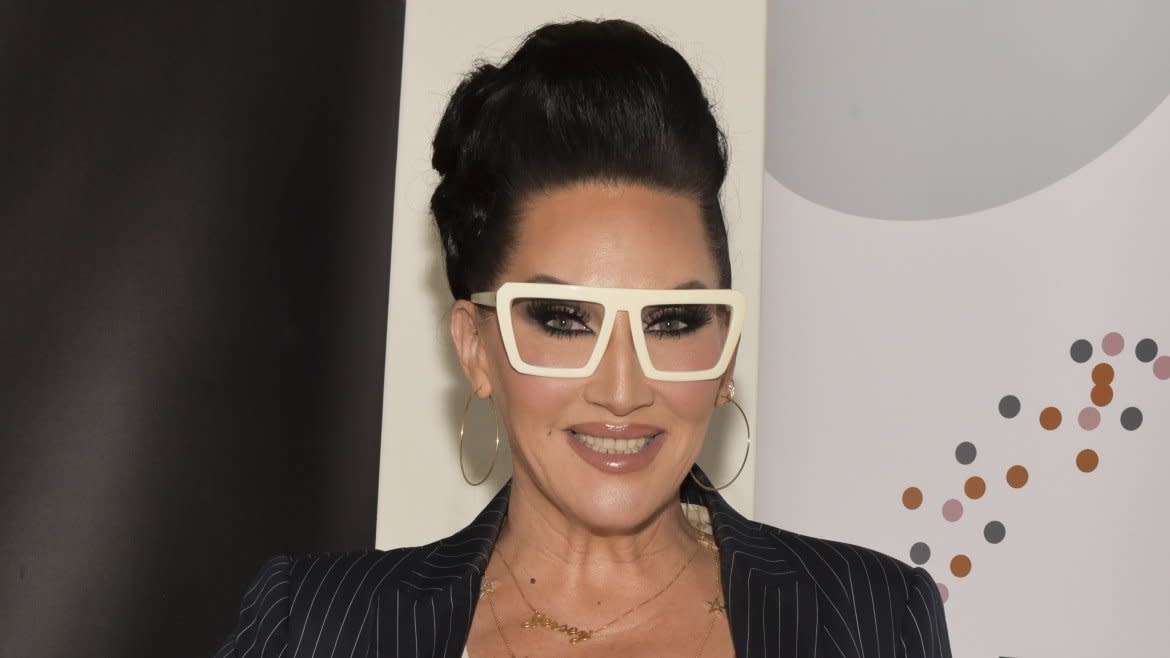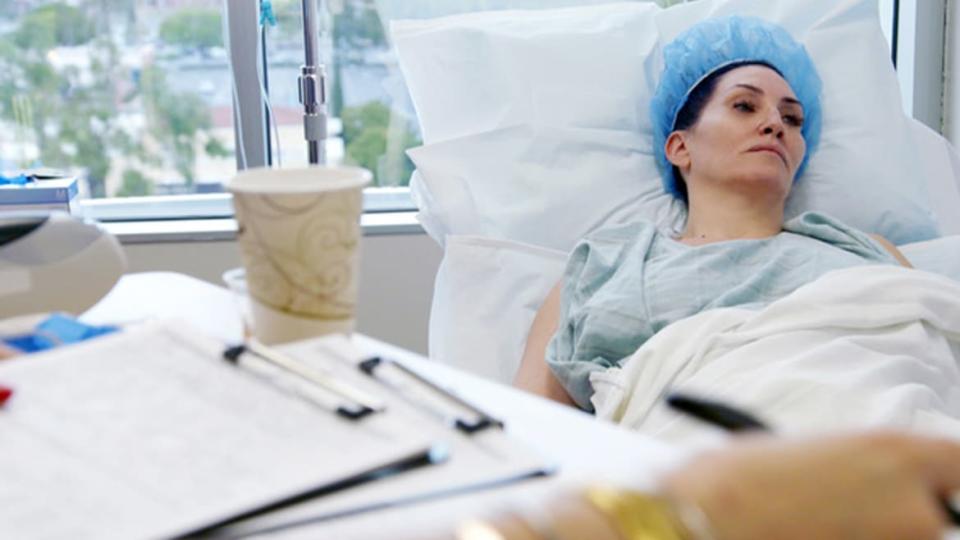Michelle Visage Removed Her Famous Breast Implants to Save Her Life. Now She’s On a Whistleblowing Mission.

- Oops!Something went wrong.Please try again later.
Before she was a nurturing yet no-nonsense—and no-filter—judge on RuPaul’s Drag Race, Michelle Visage broke out in Hollywood as a member of the girl group Seduction, which scored a major hit in 1990 with the song “Two Make It Right.”
Before that, she was a young girl growing up in New Jersey. Her body insecurities and career path would eventually motivate her to get three sets of breast implants over 30 years. Then, in 2019, she decided to remove the final pair after decades of battling an autoimmune disease that, she says, was linked to silicone in her implants.
“I spent my whole life battling eating disorders and always feeling less than because boyfriends, you know, would play bongos on my chest or make fun of me because I was so flat chested,” Visage tells The Daily Beast, speaking the week before the documentary Explant premieres at the Tribeca Film Festival. Her father’s secret Playboy stash was easy to find. She became obsessed with looking like the models, but knew she never would—at least not naturally. She jokes in the film that she was “literally: ribs, nipple.”
Explant is produced by World of Wonder co-founders Randy Barbato and Fenton Bailey, with executive producers Michelle Visage and David Case. It follows Visage’s journey to have her implants removed.
Along the way, it chronicles her own relationship with her body and why she got implants in the first place. More, it tracks the exasperating, potentially life-threatening fight to have her symptoms taken seriously by doctors who didn’t believe “breast implant illness” exists, and her whistleblowing efforts to force the medical industry to warn patients of the potential dangers.
When we talk, she’s candid about her own story, relaying the time Michael Bay was directing Seduction’s video for the single “Heartbeat” when Visage was just 21. He took her aside and asked if she could stuff her bra to make her chest look bigger.
“I was like, there’s two pairs of socks in there already, so I don't understand what more to do,” she remembers. “He didn’t say I looked ugly and he wasn’t making fun of me. He was alluding to the fact that he wanted my boobs bigger because, you know, that was Hollywood in 1990. It’s just the way that it was. Boobs were the thing.”
They continued to be a thing for her—an unexpectedly dramatic, life-risking thing—for the next 30 years.
Now, at the height of her career, Visage has added breast implant illness awareness to her docket of LGBT activism. As she bragged to a packed arena in London during her first public performance after her explant, “I’m 50 years old and I love my small tits, for the first time in my life.”
“This movie wasn’t about me going, ‘Oh, I’m narcissistic and everybody needs to know about my suffering,’” she says, referencing the Hashimoto’s disease, an autoimmune disorder, that was behind her decision to explant.
“It wasn’t about that at all. My husband was like, you know, this is something that needs to be not only exposed, but talked about so we can try to effect change. Because it took me years and years to understand what was even going on.”
Visage got her first set of implants at age 21. Ten years later, she upgraded to set number two. Her third set of implants were installed in 2016. “All along, they were making me sicker and sicker, I believe,” she says.
Since she was first diagnosed when she was 29, her autoimmune disorder attacked her thyroid. But she struggled managing her symptoms. No doctor ever linked the escalating symptoms with her breast implants because, as far as they were concerned, they were FDA-approved and safe.
That she suffered for so long never made sense to her. “I’m neurotic to begin with,” she says, joking that she was one of those mothers who raised her daughters on “organic milk only,” even if money was tight.
She brings up an “analogy” she says she uses a lot. “Have you ever gone to Disney and walked down Main Street, U.S.A. and seen the families that are clearly overweight but they're shoving turkey legs, funnel cakes, and churros in their face? I would watch them and go, they look blissfully happy. Ignorance is bliss. And I’m the opposite of that. I would sit there and I would find myself jealous of their happiness while I was being neurotic over any pain, pang, anything in my body.”
She has always been self-aware enough to know she is a hypochondriac, but she also knew she wasn’t crazy and that her symptoms were real. She was feeling them. “I eat clean, more or less. I don’t drink, ever. I don’t do drugs, ever. I don’t smoke, ever. The only thing that was invading my body were two giant blobs of silicone.”
Doctors told her for years that the sickness was in her head. But when she researched online, she saw that thousands of women had written about experiencing the same symptoms she had. And they were linking their autoimmune disease to breast implant illness. She then found a Facebook group where women who explanted said things changed immediately.
The FDA and many members of the medical community don’t—or at least didn’t—recognize breast implant illness as a real disorder. Some called it a fad. Psychosomatic. Socially contagious. Women had lobbied the FDA and lawmakers, attending hearings about breast implant safety regulations and speaking while on the verge of tears, only to, for decades, be ignored.
Learning that shocked Visage. She thought no one had been talking about this issue or trying to do anything about it. It turns out these women were. They were just not being heard.

“They’re crying their hearts out to these old white men who won’t even look them in the eyes, not even acknowledging the fact that these women are sick, some of them dying,” she says. “Instead of listening and going, ‘Jesus Christ, something’s got to change,’ they’re probably looking down at a menu at their local fucking Jersey Mike’s.”
It goes to show, she says, that women are not taken care of in this country. “My God, you’d think it’s like 1952. It’s crazy, isn’t it? Most of these women want what I want, which is just transparency. I understand that if we don’t get surgery you won’t be driving a Rolls Royce. I do understand that. But wouldn’t it be better if you drove a Honda, and women were healthy?”
Explant cites a 2018 report from the University of Texas MD Anderson Cancer Center on the long-term health effects of breast implants, which found that women with silicone implants could be up to eight times more likely to develop autoimmune issues and could also develop a rare cancer of the immune system, ALCL—though the limits of the study prevented it from declaring a causative effect.
Still, this last year, the FDA issued guidance for strict labeling of implants detailing these health risks. The issue that irks Visage: that labeling is only seen on the packaging by the surgeon. It’s still up to the doctors, many of whom may still be skeptical about “breast implant illness,” to relay the information to their patients.
She remembers when she was 33 and her second set of implants had a leak. “If a doctor had told me at that point that ‘the implants could be the cause of your autoimmune and why you’re feeling like shit,’ I 100 percent, without even thinking about it, would have said, ‘Take them out. I’m done.’”
And that’s what her fight is about now. She wants the movie to let women know that they’re not crazy for linking their breast implants to autoimmune symptoms. “They do not need an antidepressant. They do not need to go home and smoke weed or have a glass of wine.”
The end goal, too, is to raise enough awareness that the FDA will mandate that surgeons have this conversation with their patients.
Visage is used to talking about her breasts. Prior to her explant procedure, they were two scene-stealing supporting characters of her appearances on the Drag Race judging panel. The competing queens joked about them. RuPaul joked about them. More than both, she herself joked about them.
“Ironically, they’re not as big as people think they are,” she says at the start of Explant. It’s an abracadabra of support garments and optical illusions—or, as one famous episode of Drag Race coined, “proportionizing”—that creates the Jessica Rabbit shape she’s known for. “That’s what the joy is, pushing them up and making them cartoony.”
Over the years, across various radio shows, hosting gigs, and especially on the podcast RuPaul: What’s the Tee with Michelle Visage, she often talked candidly with Ru about her reasons for getting implants. She insisted that it was her decision, done for her own self-esteem and confidence—not something influenced by the male gaze and industry pressure.
“I did do it for myself,” she says. “There’s a lot of women who are going to watch this and go, ‘Well, I did it for myself, too, because I don’t like the way I look in the mirror. I don’t like the way that I look in clothing. I don’t feel attractive.’ I 100 percent did it because I thought it would make me more attractive. I just wanted to be hot to everybody, right, and I didn’t feel hot.”
The reason she showcased her breasts so often in her career, she says: “Because I loved them.”
There’s been a sense of validation through her explant journey. Not just because discovering the other women in the online groups made her feel less alone, but because going public with her procedure has started a dialogue. She says several celebrities have reached out to her for advice and information about their own possible explant surgeries.
She’s adamant about not regretting her implants. She’s not even sure if, even after all this, a 21-year-old version of herself would have decided against them if a surgeon had explained the possible risk. “What I regret—and more like resent—is the fact that I wasn’t given the information.”
There’s an interesting scene in the documentary where Visage is talking with her husband, David Case, and her daughter, Lola, about the major decision to remove her implants. Lola wonders if, for a professional entertainer known for her large breasts, the surgery might hurt her career.
“Lola was right to actually say that,” Visage says. “She was half-joking, but I can imagine as a teenager thinking, ‘Well shit, my mom, she’s all boobs. Like what if Dolly Parton got rid of her boobs, what would happen now?’”
She pauses to admonish herself for being too cheeky with that reference.
“I’m not comparing myself to Dolly, before anybody attacks me. Dolly is a fucking goddess in every element of the word. But I’m talking about boobs, and her concern was legit. ‘I know what Mom does. I know what she looks like. What if this affects the food on our table?’ But for me, it was more about the message, and it still is: loving yourself enough to accept who you are, with what you look like now.”
Get our top stories in your inbox every day. Sign up now!
Daily Beast Membership: Beast Inside goes deeper on the stories that matter to you. Learn more.

